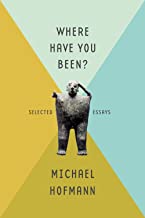Where Have You Been: Selected Essays, Michael Hofmann 2014
I had never heard of Hofmann before reading one of those fantastic, unpredictable, but always interesting interviews with authors that run monthly in The Paris Review. I learned that Hofmann is the leading German/English translator of our time, a much respected poet, critic and literary reviewer, and a professor at the University of Florida. Intrigued by his erudition and wit in the interview, I turned to his collection of essays, though I could just as easily have read his poetry (six volumes), prose, translations of poets and novelists, or edited volumes of Ovid, Malcolm Lowry, and German poets. His writing is enormously erudite and equally as dense, and I often felt I was over my head and felt like giving up. And then, I would read one of his shimmeringly beautiful or wonderfully clever and humorous sentences and continue on until, eventually, I finished the book. This is not a book for the faint-hearted. It spends most of its pages discussing in excruciating detail (word by word analysis, often) the work of German, Australian, or American poets and novelists whom I had never heard of—Gottfried Benn, Arthur Schnitzler, Basil Bunting, W. S. Graham, Les Murray, Karen Solie—- though some well-known American (Lowell, Bishop Frost) and British (Hughes, Heaney) writers and German artists (Beckmann, Schwitters) also rate chapters . This is fare intended for the professor of English or German literature, but again, every few pages, a wonderful sentence rescued a chapter and pushed me on. As I was finishing this volume today and feeling quite self-congratulatory, along came a wonderful essay in the New York Times Book Review about the work of Dr. Thomas Browne, a 17th C physician and writer. The author of the essay describes Browne’s work in exactly the terms I would have used to describe Hofmann’s were I a better critic: “The power of Browne (read Hofmann) is the power of the sustained gaze, the delight of concentration on objects….Browne’s best sentences possess the quality of a piece of glass held up into the light and turned.” The essay goes on to quote Borges about Browne, two of my favorites. I’m now prepared to add Hofmann to that short list. Here are some examples of his writing:
From a chapter on Basil Bunting, a little remembered British poet: “Just as there are some faces that are a gift to the photographer (Artaud, Patti Smith), so certain lives are a gift to the biographer. These are, broadly, of two types: the hard and gemlike, abbreviated, compressed, intense; and the lengthy, implausible, exfoliated, whiskery, picaresque. Vehement or even violent emotion is good, overt drama, prominent contacts or associations, sudden changes of orientation, movement through different societies and settings; physical distance is helpful (the father of letter writing), marriages (more than one—important), a hint of scandal or controversy is useful, achievement and neglect, both in moderation (poverty is a great preservative, celebrity or laurels a terrible corrosive, too-obvious or excessive greatness is dreary). A late flowering is ideal, but not essential.”
From a chapter on Australian Poets: “Stumbling around the house at moments of absentmindedness or in the off-hours, I wonder where the economy-sized fish tank came from, or the dictionary of some unexpectedly eloquent Oceanian language, or the errant slab of copper sulfate (did some friend or enemy leave it?). Then I remember, it’s the new Australian poetry anthology I am reading, the thick end of the 1100 pages…..Of course, I know anthologies aren’t for reading straight through, any more than cars are for test-driving or cosmetics are for lab mice, but what else can you do? The thickness is alarming, but the fear gradually abates, as your marker moves forward and you yourself grow stronger from toting the book around.”
From a chapter on Stefan Zweig who he savagely attacks: “…(he) left a suicide note that, like most of what he wrote is so smooth and mannerly and somehow machined—-actually more like an Oscar acceptance speech than a suicide note—one feels the irritable rise of boredom halfway through it, and the sense that he doesn’t mean it, his heart isn’t in it….Stefan Zweig just tastes fake. He’s the Pepsi of Austrian writing.”
Hofmann is quite wonderful and I look forward to reading more of his work.



